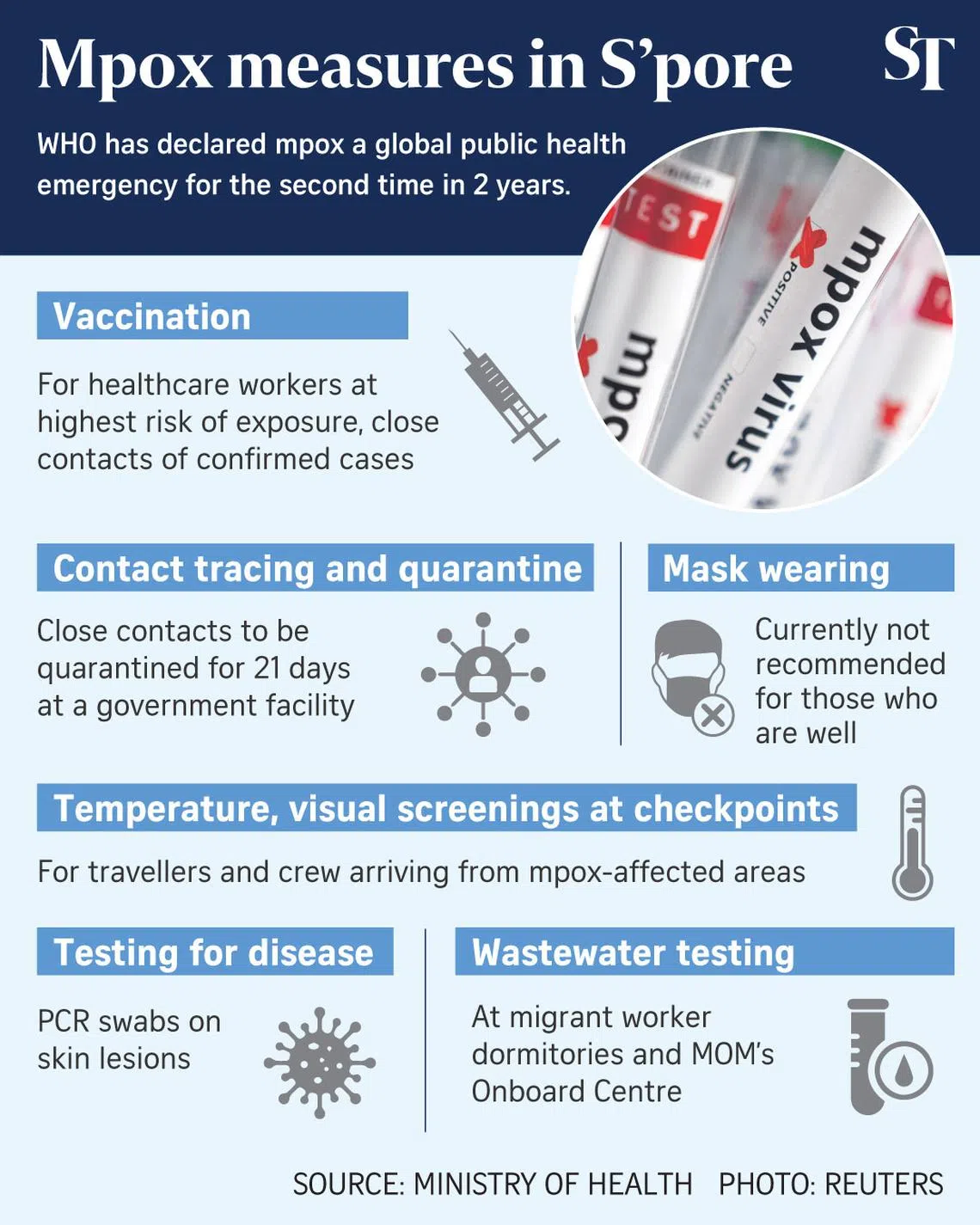Mpox vaccine for those at high risk in Singapore, virus troublesome but can be managed: Ong Ye Kung
Sign up now: Get ST's newsletters delivered to your inbox

(From left) Director-general of health Kenneth Mak, Health Minister Ong Ye Kung, and communicable diseases policy and preparedness division consultant Marc Ho at a press conference on preparedness for mpox on Sept 4.
ST PHOTO: JASON QUAH
SINGAPORE - Vaccinations against mpox are being given free to healthcare workers who are at highest risk of exposure to mpox, and the jabs will also be given to close contacts of confirmed cases, said Health Minister Ong Ye Kung on Sept 4.
This is to ensure that the people who need it most will be given protection, he said at a press conference held at the ministry.
Immediate contact tracing will be carried out for close contacts of confirmed clade I cases, and they will be quarantined for 21 days, the incubation period observed in Africa.
Jynneos, a live, non-replicating vaccine, has been used in Singapore for protection against mpox and smallpox,
Singapore’s current supply of Jynneos is sufficient, based on this vaccination strategy, and the Ministry of Health (MOH) will continue to monitor the situation and adjust its strategy as the mpox situation and vaccine supplies evolve globally, the minister said.
Mr Ong said: “Mpox is a troublesome virus which we can manage.”
Recognising that every virus has different characteristics, he said: “Never fall into the trap of fighting the last war.”
Singapore may have to adapt its measures over time when the situation evolves and as the world understands the virus better, Mr Ong added. He pointed out that whatever strategies were used to fight the Covid-19 pandemic should not be repeated to handle mpox clade I, should it come into Singapore.
While the mpox clade I virus appears to be more infectious, it is far less transmissible than respiratory viruses such as influenza and Covid-19.
An important characteristic of mpox clade I, Mr Ong said, is that it is mainly transmitted through close physical contact such as skin to skin, mouth to skin, or mouth to mouth. Each infected person can spread it to an average of 1.3 persons. By comparison, this number is five for Covid-19 (Omicron) and 10 for measles.
“It will very unlikely lead to the kind of disruption that happened during Covid-19,” Mr Ong said, adding that there is no need to vaccinate everyone.
However, the measures put in place during the pandemic continue to be applicable in preventing the spread of mpox.
Based on current evidence that mpox is spread mainly through close physical contact, MOH has notified all medical practitioners and healthcare institutions to be vigilant in detecting and reporting all mpox cases to MOH immediately, including – and especially for – suspected clade I infections.
Suspect cases will be transferred to hospitals for further assessment and treatment, if necessary.
Infected adults will be taken to the National Centre for Infectious Diseases (NCID) and infected children to KK Women’s and Children’s Hospital. Adult and child family members who are affected, such as mother and child or father and child, will be taken to the National University Hospital.
Such cases will be isolated, pending test results, and those who test positive for clade I will continue to be isolated in healthcare facilities until they are no longer infectious.
Unlike Covid-19, which is spread mainly through droplets produced when an infected person coughs or sneezes, Mr Ong said contact tracing for mpox will be done physically and does not need any digital solution, such as TraceTogether.
However, to prevent the spread of mpox clade I, Mr Ong said the existing measures and protocols for other infectious diseases remain relevant.
Citing the example of pre-schools and schools, he said the protocols for hand, foot and mouth disease such as maintaining good hygiene practices, conducting visual screening for symptoms, and outbreak management measures like isolation, contact tracing, decontamination of premises, and temporary closure, continue to be pertinent.
He said MOH will also be working with the Ministry of Manpower and the National Environment Agency to conduct wastewater testing at migrant worker dormitories and the Onboard Centre, where temperature and visual screenings have also been put in place for newly arrived work permit holders.
In the event any clade I cases are detected, there are protocols in place for isolation, transport of suspected cases to hospital for testing and assessment, and containment measures to support workers in their recovery and prevent any further spread within dormitories.
The disease, formerly known as monkeypox, can spread through close contact. Though it is usually mild, it can be fatal in rare cases. It causes flu-like symptoms and pus-filled lesions on the body.
According to the World Health Organisation (WHO), there have been 102,977 confirmed cases of mpox due to both clades I and II, including 219 deaths reported by 121 countries since the beginning of mpox monitoring in 2022, until July 31, 2024. Singapore has detected 14 clade II cases and no clade I cases in 2024.
When asked if healthcare workers are being protected against clade II mpox virus, director-general of health Kenneth Mak said vaccinating doctors and nurses tending to mpox cases was already in effect. However, there are no statistics on how many of them have received the vaccine.
On Aug 14, WHO declared mpox a global public health emergency
As a precautionary measure against the import of mpox from abroad, Singapore started temperature and visual screening at both air and sea checkpoints
MOH had said that while there are no direct flights between Singapore and any country with an mpox outbreak, temperature and visual screening at Changi and Seletar airports were in place for inbound travellers and flight crew from places that may be exposed to the risk of mpox outbreaks.
Similar screening measures have also been implemented at sea checkpoints for crew and passengers arriving on ships from mpox-affected areas.
Health advisories have also been put in place so that travellers will take personal precautions to avoid being infected.
They are strongly advised to follow the advisory, especially if they are travelling to and from affected countries. Those found to have fever, rash and/or symptoms compatible with mpox will be referred for medical assessment.
Despite the new and potentially more deadly clade Ib strain of the mpox virus rapidly spreading in the Democratic Republic of Congo and its neighbouring countries, infectious disease specialists say there is no need for panic buying, especially of masks
Residents and visitors coming from these places also do not need to be quarantined



